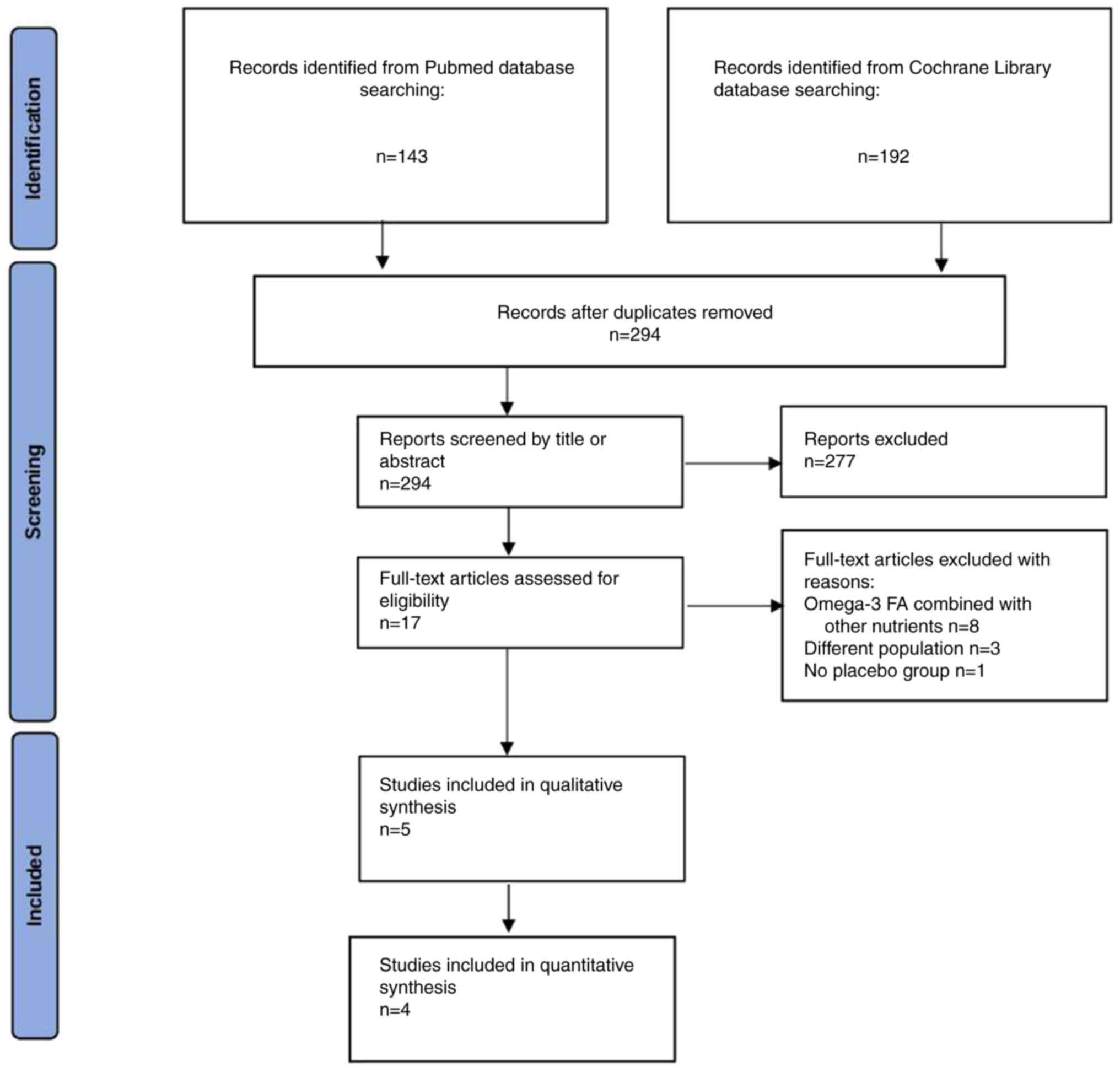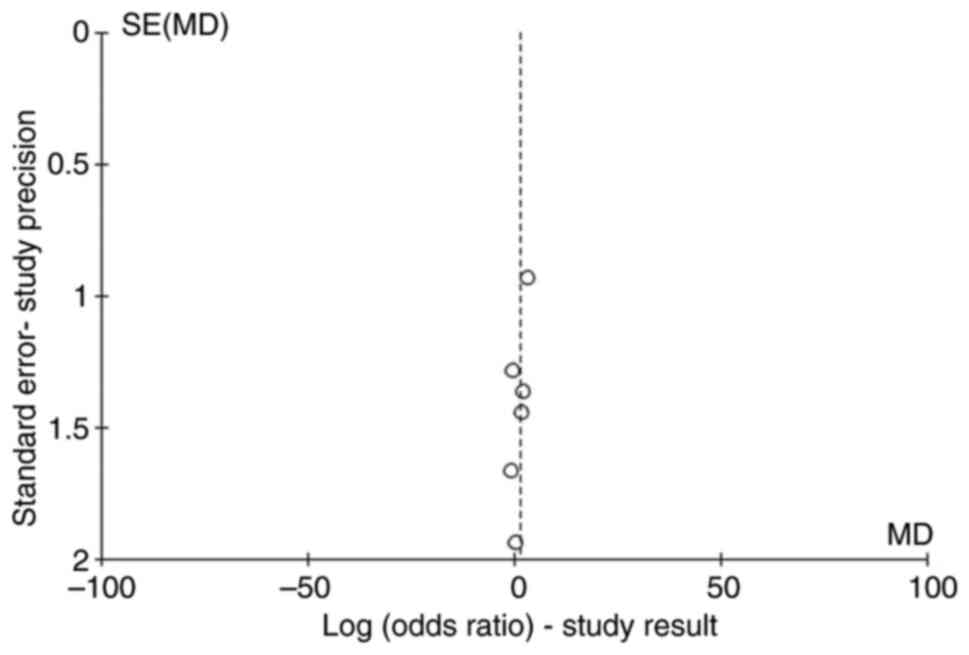|
1
|
Scheltens P, De Strooper B, Kivipelto M,
Holstege H, Chételat G, Teunissen CE, Cummings J and van der Flier
WM: Alzheimer's disease. Lancet. 397:1577–1590. 2021.PubMed/NCBI View Article : Google Scholar
|
|
2
|
Long JM and Holtzman DM: Alzheimer
disease: An update on pathobiology and treatment strategies. Cell.
179:312–339. 2019.PubMed/NCBI View Article : Google Scholar
|
|
3
|
Herrup K: Reimagining Alzheimer's
disease-an age-based hypothesis. J Neurosci. 30:16755–16762.
2010.PubMed/NCBI View Article : Google Scholar
|
|
4
|
Kueper JK, Speechley M and Montero-Odasso
M: The Alzheimer's disease assessment scale-cognitive subscale
(ADAS-Cog): Modifications and responsiveness in pre-dementia
populations. A narrative review. J Alzheimers Dis. 63:423–444.
2018.PubMed/NCBI View Article : Google Scholar
|
|
5
|
Shahidi F and Ambigaipalan P: omega-3
polyunsaturated fatty acids and their health benefits. Annu Rev
Food Sci Technol. 9:345–381. 2018.PubMed/NCBI View Article : Google Scholar
|
|
6
|
Yehuda S, Rabinovitz S and Mostofsky DI:
Essential fatty acids and the brain: From infancy to aging.
Neurobiol Aging. 26 (Suppl 1):S98–S102. 2005.PubMed/NCBI View Article : Google Scholar
|
|
7
|
Cole GM, Ma QL and Frautschy SA: Omega-3
fatty acids and dementia. Prostaglandins Leukot Essent Fatty Acids.
81:213–221. 2009.PubMed/NCBI View Article : Google Scholar
|
|
8
|
MacLean CH, Mojica WA, Morton SC, Pencharz
J, Hasenfeld Garland R, Tu W, Newberry SJ, Jungvig LK, Grossman J,
Khanna P, et al: Effects of omega-3 fatty acids on lipids and
glycemic control in type II diabetes and the metabolic syndrome and
on inflammatory bowel disease, rheumatoid arthritis, renal disease,
systemic lupus erythematosus, and osteoporosis. Evid Rep Technol
Assess (Summ). (89):1–4. 2004.PubMed/NCBI
|
|
9
|
Smollich M: Special | Omega-3-Fatty Acids
Omega-3 fatty acids and brain function. Ernahrungs Umschau.
62:170–177. 2015.https://www.ernaehrungs-umschau.de/fileadmin/Ernaehrungs-Umschau/pdfs/pdf_2015/10_15/EU10_2015_WuF_Smollich_Eng.pdf.
|
|
10
|
Higgins JPT, Sterne JAC, Savović J, Page
MJ, Hróbjartsson A, Boutron I, Reeves B and Eldridge S: A revised
tool for assessing risk of bias in randomized trials. Cochrane
Database Syst Rev. 10:29–31. 2016.
|
|
11
|
Brozek JL, Akl EA, Alonso-Coello P, Lang
D, Jaeschke R, Williams JW, Phillips B, Lelgemann M, Lethaby A,
Bousquet J, et al: Grading quality of evidence and strength of
recommendations in clinical practice guidelines. Part 1 of 3. An
overview of the GRADE approach and grading quality of evidence
about interventions. Allergy. 64:669–677. 2009.PubMed/NCBI View Article : Google Scholar
|
|
12
|
Freund-Levi Y, Eriksdotter-Jönhagen M,
Cederholm T, Basun H, Faxén-Irving G, Garlind A, Vedin I, Vessby B,
Wahlund LO and Palmblad J: Omega-3 fatty acid treatment in 174
patients with mild to moderate Alzheimer disease: OmegAD study: A
randomized double-blind trial. Arch Neurol. 63:1402–1408.
2006.PubMed/NCBI View Article : Google Scholar
|
|
13
|
Quinn JF, Raman R, Thomas RG, Yurko-Mauro
K, Nelson EB, Van Dyck C, Galvin JE, Emond J, Jack CR Jr, Weiner M,
et al: Docosahexaenoic acid supplementation and cognitive decline
in Alzheimer disease: A randomized trial. JAMA. 304:1903–1911.
2010.PubMed/NCBI View Article : Google Scholar
|
|
14
|
Lin PY, Cheng C, Satyanarayanan SK, Chiu
LT, Chien YC, Chuu CP, Lan TH and Su KP: Omega-3 fatty acids and
blood-based biomarkers in Alzheimer's disease and mild cognitive
impairment: A randomized placebo-controlled trial. Brain Behav.
Immun. 99:289–298. 2022.PubMed/NCBI View Article : Google Scholar
|
|
15
|
Chiu CC, Su KP, Cheng TC, Liu HC, Chang
CJ, Dewey ME, Stewart R and Huang SY: The effects of omega-3 fatty
acids monotherapy in Alzheimer's disease and mild cognitive
impairment: A preliminary randomized double-blind
placebo-controlled study. Prog Neuropsychopharmacol Biol
Psychiatry. 32:1538–1544. 2008.PubMed/NCBI View Article : Google Scholar
|
|
16
|
Shinto L, Quinn J, Montine T, Dodge HH,
Woodward W, Baldauf-Wagner S, Waichunas D, Bumgarner L, Bourdette
D, Silbert L and Kaye J: A randomized placebo-controlled pilot
trial of omega-3 fatty acids and alpha lipoic acid in Alzheimer's
disease. J Alzheimers Dis. 38:111–120. 2014.PubMed/NCBI View Article : Google Scholar
|
|
17
|
Ajith TA: A recent update on the effects
of omega-3 fatty acids in Alzheimer's disease. Curr Clin Pharmacol.
13:252–260. 2018.PubMed/NCBI View Article : Google Scholar
|
|
18
|
Hooijmans CR, Pasker-de Jong PCM, de Vries
RB and Ritskes-Hoitinga M: The effects of long-term omega-3 fatty
acid supplementation on cognition and Alzheimer's pathology in
animal models of Alzheimer's disease: A systematic review and
meta-analysis. J Alzheimers Dis. 28:191–209. 2012.PubMed/NCBI View Article : Google Scholar
|
|
19
|
Ferretti MT, Iulita MF, Cavedo E, Chiesa
PA, Schumacher Dimech A, Santuccione Chadha A, Baracchi F, Girouard
H, Misoch S, Giacobini E, et al: Sex differences in Alzheimer
disease - the gateway to precision medicine. Nat Rev Neurol.
14:457–469. 2018.PubMed/NCBI View Article : Google Scholar
|
|
20
|
Phillips MA, Childs CE, Calder PC and
Rogers PJ: No effect of omega-3 fatty acid supplementation on
cognition and mood in individuals with cognitive impairment and
probable Alzheimer's disease: A randomised controlled trial. Int J
Mol Sci. 16:24600–24613. 2015.PubMed/NCBI View Article : Google Scholar
|

















